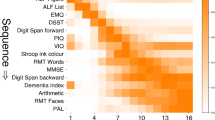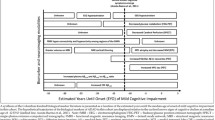Summary
The hypothesis that mild cognitive impairment (MCI) represents an early stage of Alzheimer’s disease (AD) was investigated by reviewing recent research from three sources: asymptomatic and symptomatic individuals carrying mutations that cause AD, hospital-samples of non-demented patients with MCI at the initial examination that are followed longitudinally, and community-based incident cases of AD.
Studies with asymptomatic mutation carriers of the amyloid precursor protein and presenilin 1 gene have shown a linear and disease-related decline in most cognitive functions that begins approximately 10 years before the expected clinical onset of AD. However, there is considerable overlap between the level of impairment for mutation carriers and non-carriers of the same age during the early preclinical stage of AD. Hospital-based longitudinal studies have shown that non-demented individuals with isolated mild episodic memory impairment may develop clinically diagnosed AD with widespread cognitive deficits in a few years time. Community-based epidemiological studies on the incidence of AD demonstrate that indices of episodic memory, in addition to measures of general cognitive functioning, are useful in predicting early AD. In contrast, subjective memory impairment or age-associated memory impairment are less powerful predictors of future dementia development.
In summary, there is converging evidence to demonstrate that preclinical AD is characterized by a common behavioral phenotype, with cognitive decline in several domains, predominantly in episodic memory. The decline appears to start many years before the clinical onset of AD. Moreover, the progression of the impairment appears to be continuous. Finally, this pattern of performance generalizes across etiology of AD (familial or sporadic), clinical onset (early or late), sample composition (hospital or community), and method of assessment.
Access this chapter
Tax calculation will be finalised at checkout
Purchases are for personal use only
Preview
Unable to display preview. Download preview PDF.
Similar content being viewed by others
References
Almkvist O (1996) Neuropsychological features of early Alzheimer’s disease: preclinical and clinical stages. Acta Neurol Scand [Suppl] 165: 63–71
Almkvist O, Bäckman L (1993) Progression in Alzheimer’s disease: sequencing of neuropsychological decline. Int J Geriatr Psychiatr 8: 755–763
Almkvist O, Basun H, Wahlund LO, Lannfelt L (1995) Cognitive functions of familiy members with and without the APP670/671 mutation. In: Iqbal K, Mortimer JA, Winblad B, Wisniewski HH (eds) Research advances in Alzheimer’s disease and related disorder. John Wiley, New York, pp 251–259
Almkvist O, Jelic V, Lannfelt L, Nordberg A, Shigeta M, Wahlund LO, Winblad B (1996) Alzheimer’s disease with and without familial aggregation: a case for phenotypical similarity. In: Turner JD, Beyreuther K, Theuring F (eds) Alzheimer’s disease: etiological mechanisms and therapeutic possibilities (Ernst Schering Research Foundation, Workshop 17). Springer, Berlin Heidelberg New York Tokyo, pp 1–15
Almkvist O, Basun H, Wagner S, Wahlund LO, Lannfelt L (1997a) Impaired cognitive functions are strongly related to low cerebrospinal fluid levels of α-cleaved amyloid precursor protein in the Swedish Alzheimer mutation family. Arch Neurol 54: 641–644
Almkvist O, Jensen M, Basun H, Wahlund LO, Amberia K, Viitanen M, Lannfelt L (1997b) Elevated cerebrospinal fluid tau correlates with Alzheimer disease symptoms in apolipoprotein E ε4(+) carriers. (submitted)
Aronson MK, Ooi WL, Morgenstern H, Hafner A, Masur D, Crystal H, Frishman WH, Fisher D, Katzman R (1990) Women, myocardial infarction, and dementia in the very old. Neurology 40: 1102–1106
Bondi MW, Monsch AU, Galasko D, Butters N, Salomon DP, Delis DC (1994) Preclinical markers of dementia of the Alzheimer type. Neuropsychol 8: 374–384
Braak H, Braak E (1992) Neuropathological stageing of Alzheimer-related changes. Acta Neuropathol 82: 239–259
Brooks J, Kraemer HC, Tanke ED, Yesavage JA (1993) The methodology of studying decline in Alzheimer’s disease. J Am Geriatr Soc 41: 623–628
Brun A, Gustafson L (1976) Distribution of cerebral degeneration of Alzheimer’s disease. Arch Psychiatr Nervenkrank 223: 15–23
Devanand DP, Folz M, Gorlyn M, Moeller JR, Stern Y (1997) Questionnable dementia: clinical course and predictors of outcome. J Am Geriatr Soc 45: 321–328
Farlow M, Murrell J, Ghetti B, Unverzagt F, Zeldenrust S, Benson M (1994) Clinical characteristics in a kindred with early-onset Alzheimer’s disease and their linkage to a G⇒T change at position 2149 of the amyloid precursor protein gene. Neurology 44: 105–111
Fewster PH, Griffin-Brooks S, MacGregor J, Ojalvo-Rose E, Ball MJ (1991) A topographical pathway by which histopathological lesions disseminate through the brain of patients with Alzheimer’s disease. Dementia 2: 121–132
Flicker C, Ferris SH, Reisberg B (1991) Mild cognitive impairment in the elderly: predictors of dementia. Neurology 41: 1006–1009
Flicker C, Ferris SH, Reisberg B (1993a) A longitudinal study of cognitive function in elderly persons with subjective memory complaints. J Am Geriatr Soc 41: 1029–1032
Flicker C, Ferris SH, Reisberg B (1993b) A two-year longitudinal study of cognitive function in normal aging and Alzheimer–s disease. J Geriatr Psychiatr Neurol 6: 84–96
Fuld PA, Masur DM, Blau AD, Crystal H, Aronson MK (1990) Object-memory evaluation for prospective detection of dementia in normal functioning elderly: predictive and normative data. J Clin Exp Neuropsychol 12: 520–528
Gray C, Delia Sala S (1996) Charting decline in dementia. In: Morris RG (ed) The cognitive neuropsychology of Alzheimer-type dementia. Oxford University Press, Oxford, pp 23–46
Grober E, Kawas C (1997) Learning and retention in preclinical and early Alzheimer’s disease. Psychol Aging 12: 183–188
Haxby JV, Raffaele K, Gillette J, Schapiro MB, Rapoport SI (1992) Individual trajectories of cognitive decline in patients with dementia of the Alzheimer type. J Clin Exp Neuropsychol 14: 575–592
Hänninen T, Hallikainen M, Koivisto K, Helkala EL, Reinikainen KJ, Soininen H, Mykkänen L, Laakso M, Pyörälä K, Riekkinen PJ (1995) A follow-up study of age-associated memory impairment: neuropsychological predictors of dementia. J Am Geriatr Soc 43: 1007–1015
Herlitz A, Small BL, Fratiglioni L, Almkvist O, Bäckman L (1997) Detection of mild dementia in community surveys: is it possible to increase the accuracy of our diagnostic instruments? Arch Neurol 54: 319–324
Jacobs DM, Sano M, Doonief G, Marder K, Bell T, Stern Y (1995) Neuropsychological detection and characterization of preclinical Alzheimer’s disease. Neurology 45: 957–962
Johansson B, Zarit SH (1997) Early cognitive markers of the incidence of dementia and mortality: a longitudinal population-based study of the oldest old. Int J Geriatr Psychiatr 12: 53–59
Karlinsky H, Vaula G, Haines JL, Ridgley J, Bergeron C, Morulla M, Tupler RG (1992) Molecular and prospective phenotypic characterization of a pedigree with familial Alzheimer’s disease and a missense mutation in codon 717 of the beta-amyloid protein gene. Neurology 42: 1445–1453
Kennedy AM, Newman SK, Frackowiak RSJ, Cunningham VJ, Roques P, Stevens J, Neary D, Bruton CJ, Warrington EK, Rossor MN (1995) Chromosome 14 linked familial Alzheimer’s disease: a clinico-pathological study of a single pedigree. Brain 118: 185–205
LaRue A, Jarvik L (1987) Cognitive function and prediction of dementia in old age. Int J Aging Hum Dev 25: 79–88
Linn RT, Wolf PA, Bachman DL, Knoefel JE, Cogg JL, Belanger AJ, Kaplan EF, D’Agostino RB (1995) The preclinical phase of probable Alzheimer’s disease. Arch Neurol 52: 485–490
Masur DM, Fuld PA, Blau AD, Crystal H, Aronson MK (1990) Predicting development of dementia in the elderly with selective reminding test. J Clin Exp Neuropsychol 12: 529–538
Masur DM, Sliwinski M, Lipton RB, Blau AD, Crystal HA (1994) Neuropsychological prediction of dementia and the absence of dementia in healthy elderly persons. Neurology 44: 1427–1432
Newman SK, Warrington EK, Kennedy AM, Rossor MN (1994) The earliest cognitive change in a person with familial Alzheimers disease: presymptomatic neuropsychological features in a pedigree with familial Alzheimer’s disease confirmed at necropsy. J Neurol Neurosurg Psychiatry 57: 967–972
O’Brien JT, Beats B, Hill K, Howard R, Sahakian B, Levy R (1992) Do subjective memory complaints precede dementia? A three-year follow-up of patients with supposed “benign senescent forgetfulnes”. Int J Geriatr Psychiatr 7: 481–486
Price JL, Davis PB, Morris JC, White DL (1991) The distribution of tangles, plaques and related immunohistochemical markers in healthy aging and Alzheimer’s disease. Neurobiol Aging 12: 295–312
Schmand B, Jonker C, Hoijer C, Lindeboom J (1996) Subjective memory complaints may announce dementia. Neurology 46: 121–125
Sliwinski M, Lipton RB, Buschke H, Stewart W (1996) The effects of preclinical dementia on estimates of normal cognitive functioning in aging. J Gerontol Psychol Sci 51B: P217–P225
Small BJ, Herlitz L, Bäckman L (1997) Cognitive development in Alzheimer’s disease: charting the decline process. In: Edelstein B (ed) Comprehensive clinical psychology: clinical geropsychology, vol 1. Elsevier Science Ltd, Oxford
Small BJ, Herlitz L, Fratiglioni L, Almkvist O, Bäckman L (1997a) Cognitive predictors of incident Alzheimer’s disease: a prospective longitudinal study Neuropsychol 11: 1–8
Small BJ, Viitanen M, Bäckman L (1997b) Mini-mental state examination item scores as predictors of Alzheimer’s disease: incidence data from the Kungsholmen Project, Stockholm. J Gerontol Med Sci 52: 299–304
Smalley SL, Wolkenstein BH, LaRue A, Woodward JA, Jarvik LF, Matsuyama SS (1992) Commingling analysis of memory performance in offspring of Alzheimer patients. Genet Epidemiol 9: 333–345
Smith GE, Petersen RC, Parisi JE, Ivnik RJ, Kokmen E, Tangalos EG, Waring S (1996) Definition, course and outcome of mild cognitive impairment. Aging Neuropsychol Cogn 3: 141–147
Snowdon J, Lane F (1994) A longitudinal study of age-associated memory impairment. Int J Geriatr Psychiatr 9: 779–787
Stern Y, Liu X, Albert M, Brandt J, Jacobs DM, Del Castillo-Castaneda C, Marder K, Bell K, Sano M, Bylsma F, Lafleche G, Tsai W-Y (1996) Application of a growth curve approach to modeling the progression of Alzheimer’s disease. J Gerontol Med Sci 51A: M179–M184
Tierney MC, Szalai JP, Snow WG, Fisher RH, Nores A, Nadon G, Dunn E, St. George-Hyslop PH (1996) Prediction of probable Alzheimer’s disease in memory-impaired patients: a prospective longitudinal study. Neurology 46: 661–665
Tomlinson BE, Blessed G, Roth M (1970) Observations on the brains of demented people. J Neurol Sci 11: 205–242
Tuokko H, Vernon-Wilkinson R, Weir J, Beattie BL (1991) Cued recall and early identification of dementia. J Clin Exp Neuropsychol 13: 871–879
Yoshitake T, Kiyohara Y, Kato I, Ohmura T, Iwamoto H, Nakayama K, Ohmori S, Nomiyama K, Kawano H, Ueda K, Sueishi K, Tsuneyosh M, Fujishima M (1995) Incidence and risk factors of vascular dementia and Alzheimer’s disease in a defined elderly Japanese population: the Hisayama study. Neurology 45: 1161–1168
Author information
Authors and Affiliations
Editor information
Editors and Affiliations
Rights and permissions
Copyright information
© 1998 Springer-Verlag/Wien
About this paper
Cite this paper
Almkvist, O. et al. (1998). Mild cognitive impairment — an early stage of Alzheimer’s disease?. In: Gertz, HJ., Arendt, T. (eds) Alzheimer’s Disease — From Basic Research to Clinical Applications. Journal of Neural Transmission. Supplementa, vol 54. Springer, Vienna. https://doi.org/10.1007/978-3-7091-7508-8_3
Download citation
DOI: https://doi.org/10.1007/978-3-7091-7508-8_3
Publisher Name: Springer, Vienna
Print ISBN: 978-3-211-83112-0
Online ISBN: 978-3-7091-7508-8
eBook Packages: Springer Book Archive




